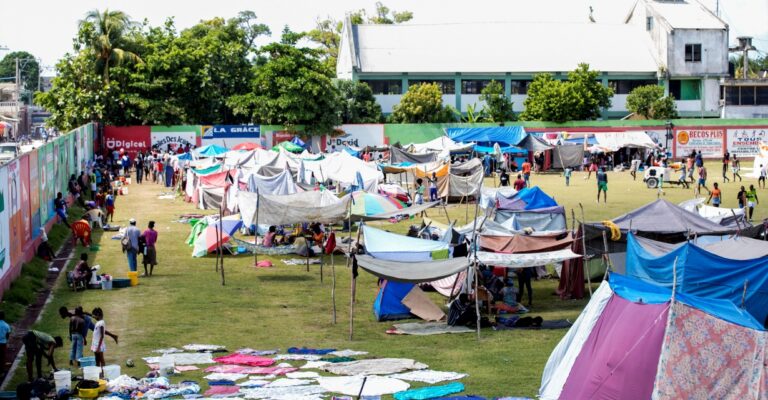
Doctors in Haiti on Monday battled in makeshift tents to save the lives of hundreds of injured people, including young children and the elderly, outside hospitals overwhelmed by an earthquake that killed at least 1,419 people.
While rescue teams toiled to dig out survivors of Saturday’s 7.2 magnitude quake, a storm dumped heavy rain on the southern coast of Haiti, bringing flooding near the worst-hit areas and exacerbating the humanitarian crisis, local residents said.
The earthquake brought down tens of thousands of buildings in the deeply impoverished country, which is still recovering from a major temblor 11 years ago and the assassination of its president, Jovenel Moise, on July 7.
Dozens of churches, hotels, homes and schools were seriously damaged or ruined by the quake. Haitian authorities said on Monday afternoon that 1,419 fatalities had been confirmed, with some 6,900 people injured and 37,312 houses destroyed.
Data circulating among aid groups indicated over 450 additional deaths had been logged in the hardest-hit department, and Haitian officials warned the toll was likely to rise.
The areas in and around the city of Les Cayes suffered the most damage, putting enormous strain on local hospitals, some of which were badly damaged.
The city’s general hospital was overwhelmed, with doctors and nurses attending patients in tents in its crowded parking lot because there was no more room inside.
Dozens lay on beds and mattresses on the grass outside the hospital. Inside, patients were on stretchers on the floor or on cots in crowded rooms with relatives by their sides.
Babies were being transported out of the hospital’s neonatal intensive care unit over concerns that the building was unsafe after the quake, according to a Reuters witness.
Dr. Lucette Gedeon, a pediatrician, had been volunteering at the makeshift neonatal ward since Saturday and said the hospital had run out of antibiotics and anesthetics.
“There have been babies that came in needing limbs amputated after they were trapped under the rubble,” Gedeon said.
Outside, Marceline Charles said her 1-month-old baby was hit by a brick when their house collapsed. The debris also cut a deep wound in the head of her 7-year-old daughter.
“I don’t know whether she’ll survive,” Charles said.
Nearby, Michelle Delva stood next to her sister, Claudine, cradling the injured woman’s infant. Delva said that when the earthquake struck, Claudine threw herself on top of her baby to save him from falling bricks. She broke her leg and needs an operation but they had been waiting outside since Saturday.
Port-au-Prince airport on Monday bustled with medics and aid workers scrambling to get to the south with supplies.
In addition to damage to some roads in the area, access to Les Cayes has been complicated by months of political turmoil in Haiti, which has left gangs in control of key access routes to parts of the country.
DIFFICULT TO REACH
At Les Cayes airport, ambulances brought the severely injured from nearby areas, a Reuters witness said. Casualties were carried on stretchers to small aircraft and a U.S. Coast Guard helicopter to be taken to Port-au-Prince, where hospital services were more intact.
Aid workers were hurrying to beat the onset of Tropical Depression Grace, which on Monday evening was moving west-northwest along southern Haiti, dumping heavy rain.
The U.S. National Hurricane Center (NHC) forecast Grace would churn alongside the quake zone, and could douse some areas with up to 15 inches of rain through Tuesday.
Some Haitians who lost their homes have been sleeping outdoors, many traumatized by memories of a magnitude 7 quake that struck far closer to Port-au-Prince, killing more than 200,000 people, according to the United Nations.
Those people in the streets would be exposed to rains amid a rising risk of waterborne diseases, such as cholera, according to Jerry Chandler, head of Haiti’s Civil Protection Agency.
(REUTERS)





